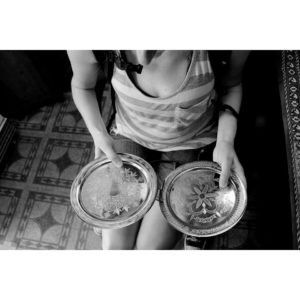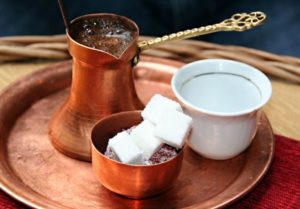How do you make the perfect cup of coffee? If you have never been to Bosnia then I am certain you don’t know. Prior to being in Bosnia I didn’t either. Like most American’s my Starbucks was never very far from my hand, and the thought of spending a couple of months in a country that the chain has not yet infiltrated was mortifying. I spent no small about of time fretting over the withdrawals and headaches that I was certain were coming. But thanks to the coffee culture that is an intimate part of life here in Bosnia, I have never experience such withdrawal.
So, how do you make the perfect cup of coffee? The first step is to grind the beans. But unlike the coarse grains you will find in America, these beans are ground so fine that they resemble powder. You do this by griding beans in a hand-cranked grinder, which can be bought from a merchant in Sarajevo. It is made of silver-plated copper, and it was designed by an artisan who spent hours tapping a small chisel into the plate. Similar pieces can be found in Saragevo’s silver alley and an example of this craftsmanship can be found below.

After the beans are ground, you scoop approximately three small spoonfuls of the powdered coffee into a small metal container called a dzezva. You boil a pot of water separately. Once the water is steaming you pour it over the grounds, and the unique shape of this container allows the majority of coffee powder to settle on the bottom, while the rest forms a thick foam at the top. Again, the picture below provides an example.
After allowing the water to sit for five minutes, you pour your first cup. But There is even an art to the pour. First, you must divide the foam on top between the cups. If there are four people you must take care to make sure that the foam is distributed relatively equally between all four people. Scooping the foam off the top simultaneously ensures that the coffee is smooth until the end, and that it remains strong. The picture of a perfect pour is provided below:

I have taken great pains to describe the process of preparation because coffee (Kafa in Bosnian) is a central part of the culture. Inviting someone for a coffee isn’t about coffee. It is a signal that someone considers you a friend and has taken a genuine interest in your life. While inviting someone for coffee in America is an indication that you are feeling them out, in Bosnia it is tantamount to offering to share a three course meal; It is only done on intimate occasion, and only with those who are friends. It has been my great pleasure to share this ritual with a few people in Bosnia, and I would like to extend a sincere thank you to the Owner of a small shop in old-town Sarajevo who has taught me everything I know about the perfect cup of coffee!